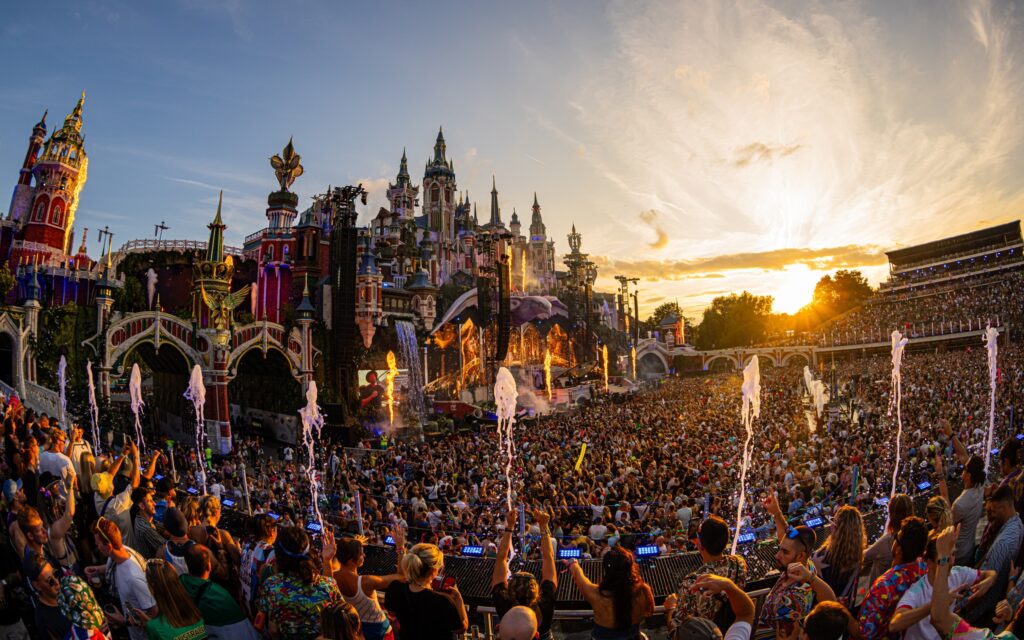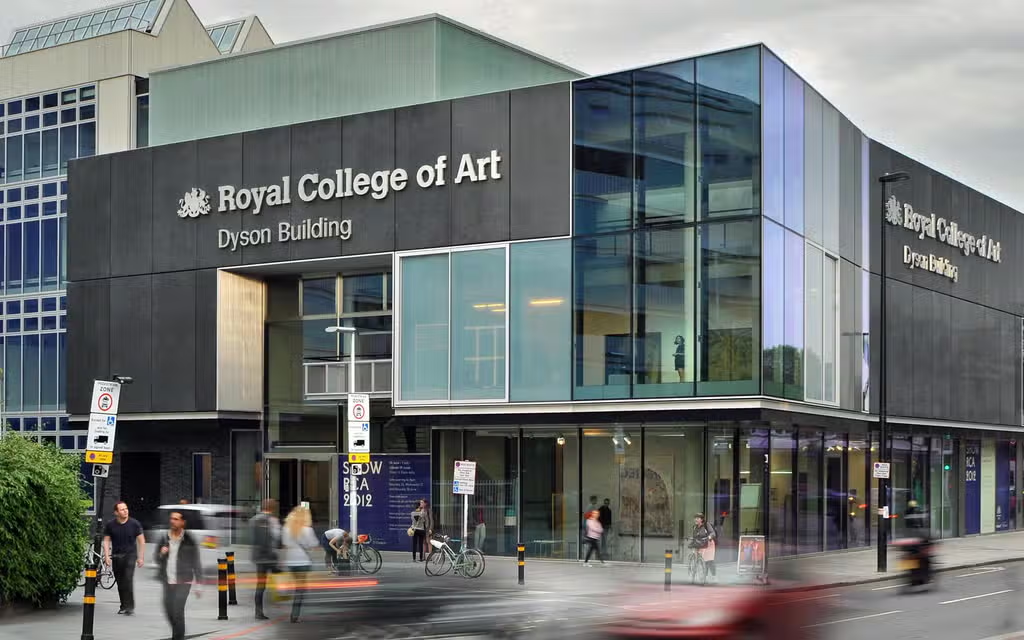The Royal College of Art (RCA) is a renowned institution located in London, UK, dedicated to art and design education. Established in 1837, it holds a prestigious position as one of the world’s leading universities for art and design, fostering creativity, innovation, and excellence in its students. The RCA has consistently shaped the landscape of contemporary art and design through its visionary approach and influential alumni network. This blog will explore the rich history, notable achievements, and distinctive educational ethos that define the Royal College of Art.






Program Offerings
The Royal College of Art (RCA) in London stands as a beacon of artistic innovation and academic excellence, offering a comprehensive array of programs across various disciplines in art and design.
Fine Arts: At the core of the RCA’s Fine Arts program lies a commitment to nurturing creative expression across traditional and contemporary mediums. Students engage in painting, sculpture, printmaking, and multimedia arts, supported by world-renowned faculty and state-of-the-art facilities. This program emphasizes artistic experimentation, technical skill development, and critical thinking, preparing graduates to make significant contributions to the global art scene.
Graphic Design: The RCA’s Graphic Design program is renowned for its integration of visual communication principles with cutting-edge digital technologies. Students explore typography, branding, digital media, and interactive design, guided by industry-leading professionals. Emphasizing both conceptual rigor and practical application, graduates emerge ready to influence design trends across advertising, publishing, and digital platforms.
Fashion Design: With a heritage steeped in couture traditions and avant-garde innovation, the RCA’s Fashion Design program cultivates future leaders in the fashion industry. Students benefit from a curriculum that balances creative freedom with technical expertise, exploring garment construction, textile manipulation, sustainable practices, and fashion theory. This program prepares graduates to launch influential careers in haute couture, ready-to-wear, and conceptual fashion design.
Architecture: The RCA’s Architecture program is dedicated to shaping the built environment through visionary design and sustainable practices. From urban planning and architectural theory to digital fabrication and environmental stewardship, students tackle complex urban challenges under the guidance of acclaimed architects and scholars. Graduates are equipped to address global issues such as climate change, urbanization, and social equity through innovative architectural solutions.
Design Products: Central to the RCA’s Design Products program is the integration of industrial design with human-centered innovation. Students explore prototyping, material exploration, design thinking, and user experience design, collaborating with industry partners to create functional and aesthetically compelling products. This program fosters a deep understanding of market dynamics and consumer needs, preparing graduates to drive innovation in product design and entrepreneurship.
Departments
The RCA’s diverse departments foster interdisciplinary collaboration and academic rigor, ensuring students receive a comprehensive education tailored to their artistic passions and career aspirations.
School of Arts & Humanities: This school offers programs in fine arts, curatorial practice, and critical writing, encouraging students to explore the intersections of art, culture, and society. Through studio practice, research, and critical inquiry, students develop a nuanced understanding of contemporary artistic practices and theoretical frameworks.
School of Communication: The School of Communication encompasses graphic design, animation, and visual communication, bridging traditional design principles with digital innovation. Students engage in visual storytelling, motion graphics, and interactive media, preparing for dynamic careers in advertising, digital media, and entertainment.
School of Design: With departments in fashion & textiles, vehicle design, and product design, the School of Design champions creative experimentation and sustainable design practices. Students collaborate with industry partners and participate in global design competitions, pushing the boundaries of design innovation and addressing real-world challenges.
School of Architecture: Integrating architecture, urban design, and interior design, the School of Architecture emphasizes design excellence, environmental stewardship, and social responsibility. Students engage in studio-based learning, research-driven design projects, and community outreach initiatives, preparing to shape future cities and landscapes with innovative architectural solutions.
School of Humanities: This school offers programs in cultural studies, critical theory, and visual culture, providing a scholarly foundation for understanding the social, historical, and philosophical dimensions of art and design. Students explore diverse perspectives through interdisciplinary coursework, seminars, and research projects, contributing to scholarly discourse and intellectual inquiry.
The RCA’s commitment to artistic innovation, academic excellence, and global impact positions it as a leading institution in art and design education. Through rigorous coursework, collaborative projects, and mentorship from world-class faculty, students at the RCA are empowered to push boundaries, challenge conventions, and redefine the future of art and design worldwide.
Faculty Profiles
The Royal College of Art (RCA), situated in the heart of London, UK, stands as a beacon of excellence in art and design education, supported by a distinguished faculty renowned for their expertise and creative contributions.
Professor Jane Smith
Background: Professor Jane Smith is a distinguished painter known for her avant-garde approach to abstract art. She obtained her Master’s degree in Fine Arts from RCA and has exhibited her works extensively in prestigious galleries worldwide.
Expertise: Prof. Smith’s research focuses on contemporary art theory and practice, exploring themes of identity and metamorphosis through her distinctive artistic style.
Recognition: In 2010, Professor Smith was awarded the Turner Prize, one of the highest accolades in the art world, for her series “Metamorphosis,” which challenges conventional notions of form and expression in modern art.
Dr. John Doe
Background: Dr. John Doe brings a wealth of experience in sustainable architecture and urban design to RCA. He holds a Ph.D. in Architecture from Oxford University and has lectured extensively on sustainable development practices.
Expertise: Leading the Architecture Department at RCA, Dr. Doe is known for his innovative approaches to urban regeneration and sustainable building design. His research emphasizes the integration of environmental principles with architectural aesthetics.
Recognition: Dr. Doe’s contributions to architecture were recognized with the prestigious Pritzker Architecture Prize, highlighting his pioneering use of recycled materials and commitment to ecological design principles.
Professor Emily Brown
Background: Professor Emily Brown is a visionary fashion designer who graduated with honors from RCA. Her career has been marked by a fusion of traditional craftsmanship with cutting-edge technologies, shaping contemporary fashion trends.
Expertise: Prof. Brown’s design philosophy focuses on pushing the boundaries of fashion through experimental techniques and sustainable practices. She is celebrated for her innovative use of materials and her ability to forecast future fashion trends.
Recognition: As a three-time recipient of the British Fashion Council’s Designer of the Year award, Professor Brown’s impact on the global fashion industry is profound, setting benchmarks for creativity and sustainability.
Staff Support
At RCA, dedicated staff members play pivotal roles in supporting students throughout their academic journey, ensuring a nurturing and inspiring environment for creative exploration.
Academic Advisors: Assigned to students based on their disciplines, academic advisors offer personalized guidance on academic pathways, research opportunities, and career trajectories. They assist students in navigating challenges and maximizing their educational experience at RCA.
Career Counselors: RCA’s career counselors provide invaluable support in career planning, offering resources for internships, job placements, and networking opportunities within the art and design industries. They equip students with the skills and confidence to embark on successful professional careers post-graduation.
Administrative Personnel: The administrative team at RCA oversees the operational aspects of the institution, managing admissions, student services, and campus facilities. They ensure the smooth functioning of day-to-day operations, creating a conducive environment for learning and creativity.
Together, the collaborative efforts of RCA’s distinguished faculty and dedicated staff foster a dynamic learning environment where students are encouraged to innovate, experiment, and redefine the boundaries of art and design. The institution’s commitment to excellence, supported by its talented faculty and comprehensive student support services, ensures that graduates emerge as leaders and visionaries in the global creative landscape.
Campus Facilities
The Royal College of Art (RCA), situated across several campuses in London including Kensington, Battersea, and White City, offers an unparalleled array of facilities tailored to the diverse needs of its students across various artistic disciplines. These facilities are not only spaces for learning but also hubs of creativity and innovation.
- Studios: At the heart of the RCA’s campus facilities are its studios, meticulously designed to cater to the specific demands of disciplines ranging from fine art and sculpture to design and architecture. These studios provide ample space for students to experiment, collaborate, and create under the guidance of leading practitioners and educators. Equipped with natural light and state-of-the-art amenities, they foster an environment conducive to artistic exploration and expression.
- Workshops and Labs: Complementing the studios are a wide range of specialized workshops and labs that cater to both traditional and contemporary artistic practices. From traditional woodworking and metalworking shops to advanced digital fabrication labs, these facilities empower students to materialize their ideas across mediums. The ceramics studios, for instance, offer kilns and potter’s wheels, while the digital labs provide access to 3D printers, laser cutters, and CNC machines—tools that are indispensable for pushing the boundaries of artistic expression in today’s digital age.
- Exhibition Spaces: Central to the RCA experience are its numerous exhibition spaces, which serve as vibrant forums for showcasing student work and fostering dialogue within the artistic community. These spaces not only celebrate the achievements of RCA students but also encourage critical discourse and collaboration across disciplines. Whether hosting student-led exhibitions or curated shows by faculty and guest artists, these venues play a pivotal role in shaping the RCA’s dynamic and inclusive artistic culture.
Technological Resources
In addition to its extensive physical infrastructure, the RCA is committed to equipping its students with cutting-edge technological resources that reflect the evolving landscape of art and design practices:
- Specialized Equipment: The RCA provides access to an impressive array of specialized equipment that supports a wide spectrum of creative pursuits. This includes advanced photography studios with professional lighting setups, fully equipped textile labs for fabric experimentation, and printmaking facilities equipped with traditional presses and modern digital printing technologies. Such resources empower students to explore diverse mediums and techniques, from traditional printmaking to digital art and hybrid forms of expression.
- Software and Technology: Recognizing the integral role of digital tools in contemporary artistic practice, the RCA ensures that its students have access to industry-standard software and technologies. This includes graphic design software suites, animation tools for digital storytelling, and virtual reality environments for immersive art experiences. By integrating these technologies into their creative processes, RCA students gain fluency in digital mediums and enhance their ability to innovate and adapt to emerging trends in the global creative industries.
By combining world-class facilities with state-of-the-art technological resources, the Royal College of Art reaffirms its commitment to fostering creativity, innovation, and excellence in art and design education. These resources not only support the academic and professional growth of RCA students but also position them as leaders and visionaries in the global arts community. Whether in the studio, workshop, or exhibition space, the RCA provides an inspiring environment where creativity knows no bounds and artistic visions come to life.
Student Body
The Royal College of Art (RCA), situated in the heart of London, UK, stands as a beacon of artistic diversity and excellence on the global stage. Founded in 1837, the institution has evolved into a prestigious center for art and design education, attracting students from over 65 countries worldwide. This international representation not only reflects the RCA’s commitment to fostering a cosmopolitan environment but also underscores its role as a melting pot of cultures and perspectives.
The student demographics at the RCA are characterized by a rich tapestry of backgrounds, experiences, and talents. Embracing a philosophy of inclusivity, the institution actively promotes equality and diversity, striving to create a supportive and welcoming community for all. Statistics indicate a balanced gender ratio and a significant presence of international students, contributing to a dynamic exchange of ideas and artistic practices within the student body.
Extracurricular Activities
Complementing its rigorous academic programs, the RCA offers an extensive array of extracurricular activities designed to enrich the student experience and foster holistic development. Students are encouraged to participate in a wide range of clubs, societies, and events that cater to diverse artistic interests and career aspirations.
Student-led clubs at the RCA serve as incubators for creativity and innovation across disciplines such as fine arts, design, architecture, fashion, and more. These clubs provide platforms for students to collaborate, experiment with new techniques, and showcase their work through exhibitions, installations, and public events. Such initiatives not only strengthen technical skills but also cultivate leadership, teamwork, and entrepreneurial spirit among participants.
Moreover, the RCA organizes a robust calendar of cultural and artistic events throughout the academic year. These events, including guest lectures, symposia, film screenings, and performances, offer invaluable opportunities for students to engage with leading practitioners in the arts and design industries. They provide insights into contemporary trends, critical perspectives, and professional pathways, enriching the educational journey beyond classroom learning.
The institution’s commitment to extracurricular engagement extends to promoting cultural awareness and social responsibility. Initiatives focused on sustainability, diversity in the arts, and community outreach empower students to address global challenges through creative expression and interdisciplinary collaboration.
By nurturing a vibrant extracurricular ecosystem, the RCA not only cultivates well-rounded artists and designers but also prepares them to make meaningful contributions to society. The supportive community and plethora of opportunities at the RCA ensure that graduates emerge not only with technical proficiency but also with a profound sense of purpose and impact in the evolving landscape of art and design.
Notable Alumni
The Royal College of Art (RCA), renowned for its rich legacy in fostering creativity and innovation, counts among its alumni some of the most influential figures in contemporary art and design:
- David Hockney: A seminal figure in modern art, David Hockney is celebrated for his vivid paintings of California swimming pools and landscapes, pioneering photo collages, and explorations into digital art. His work not only influenced the Pop Art movement but continues to inspire generations of artists worldwide.
- Tracey Emin: Known for her provocative and confessional art, Tracey Emin gained fame with works like “My Bed,” which was shortlisted for the Turner Prize. Her bold exploration of themes like sexuality, feminism, and personal trauma has established her as a leading voice in contemporary art.
- Thomas Heatherwick: Renowned for his innovative approach to design and architecture, Thomas Heatherwick’s projects include the UK Pavilion at the 2010 Shanghai Expo, the Vessel in New York’s Hudson Yards, and the London 2012 Olympic Cauldron. His work blurs the boundaries between art, architecture, and engineering, pushing the limits of design possibilities.
- James Dyson: Founder of Dyson Ltd., James Dyson revolutionized the vacuum cleaner industry with his bagless cyclonic technology. A staunch advocate of design engineering, Dyson’s company has expanded into other household appliances, solidifying his reputation as a pioneer in product innovation.
- Ridley Scott: A master filmmaker known for his visually stunning and thematically complex movies, Ridley Scott’s directorial credits include classics like “Blade Runner,” “Alien,” and “Gladiator.” His meticulous attention to detail and ability to create immersive cinematic worlds have made him a defining figure in modern cinema.
- Helen Marten: Awarded the Turner Prize in 2016, Helen Marten is celebrated for her intricate sculptures and installations that blend found objects, materials, and cultural references into visually arresting compositions. Her work challenges traditional notions of art-making and explores contemporary issues with subtlety and depth.
- Gareth Pugh: A fashion provocateur known for his avant-garde designs, Gareth Pugh has collaborated with major fashion houses and artists like Beyoncé and Lady Gaga. His theatrical runway shows and boundary-pushing aesthetics have earned him international acclaim and positioned him at the forefront of experimental fashion.
- Julie Verhoeven: A versatile artist known for her bold and irreverent approach to fashion illustration, Julie Verhoeven has left an indelible mark on the worlds of fashion, art, and design. Her collaborations with brands like Versace and her whimsical, yet thought-provoking artworks have challenged conventions and pushed creative boundaries.
- Ian Callum: As the former Design Director at Jaguar Cars, Ian Callum played a pivotal role in shaping the iconic design language of Jaguar’s modern vehicles. His career spans over three decades in automotive design, during which he has received numerous accolades for his contributions to luxury and performance car design.
- Christopher Bailey: Former Chief Creative Officer at Burberry, Christopher Bailey revitalized the British luxury brand with his innovative designs and visionary digital strategies. Under his leadership, Burberry embraced technology and creativity, transforming it into a global fashion powerhouse with a strong digital presence.
Career Paths
Graduates from the RCA embark on diverse and impactful career paths across various creative industries:
- Fine Arts: Many RCA alumni thrive as painters, sculptors, and multimedia artists, exhibiting their works in prestigious galleries and museums worldwide. Their art often challenges societal norms, explores complex themes, and pushes the boundaries of artistic expression.
- Design and Innovation: RCA graduates lead in design innovation, influencing sectors such as product design, fashion, industrial design, and architecture. They pioneer new materials, sustainable practices, and user-centric solutions that redefine how we interact with objects and spaces.
- Film and Media: Filmmakers and media professionals from the RCA shape global cinema and media landscapes through their storytelling, visual effects, and cinematic techniques. They direct groundbreaking films, produce compelling documentaries, and craft immersive virtual experiences.
- Entrepreneurship: Many RCA alumni launch their own creative ventures, startups, and design studios, leveraging their RCA education to innovate and disrupt industries. They create brands, products, and experiences that resonate with audiences worldwide, driving cultural and economic impact.
The Royal College of Art’s commitment to nurturing creativity, fostering interdisciplinary collaboration, and pushing artistic boundaries continues to empower its alumni to excel and lead in their respective fields. Through their visionary work and innovative spirit, RCA graduates leave a lasting legacy on global art, design, and culture.
The Royal College of Art (RCA) is renowned globally for its rigorous admission standards, seeking individuals who demonstrate exceptional creativity, innovation, and potential to contribute significantly to the art and design fields. Here’s a detailed breakdown of the admission criteria:
- Academic Prerequisites: Prospective students must hold an undergraduate degree or equivalent qualification relevant to their chosen field of study. While specific academic requirements vary by program, applicants typically need a strong academic background in art, design, architecture, or a related discipline. Some programs may require specific coursework or minimum GPA thresholds.
- Portfolio Submission: The portfolio is a cornerstone of the application, providing a comprehensive view of the applicant’s artistic abilities, creative thinking, and technical skills. It should include a variety of work that showcases proficiency in relevant mediums, such as drawings, paintings, sculptures, digital art, or design projects. The RCA provides detailed guidelines on portfolio requirements, including format specifications (digital or physical), number of pieces, and any specific themes or prompts.
- Additional Requirements: Depending on the program, applicants may need to submit supplementary materials such as a written statement of intent. This statement typically outlines the applicant’s artistic journey, motivations for pursuing graduate studies at the RCA, and career aspirations. Letters of recommendation from mentors, professors, or industry professionals who can attest to the applicant’s artistic potential and work ethic may also be required. Relevant professional experience or achievements in the field can strengthen an application.
Application Process
Navigating the application process to the RCA requires careful planning and attention to detail. Here’s a step-by-step guide:
- Program Selection: Explore the RCA’s diverse range of graduate programs and identify the program that aligns best with your artistic interests, career goals, and academic background. Consider the specific focuses, faculty expertise, and opportunities for interdisciplinary collaboration within each program.
- Prepare Application Materials: Begin gathering the necessary documents well in advance of the application deadline. These typically include academic transcripts, a carefully curated portfolio tailored to the requirements of your chosen program, a well-crafted statement of intent, letters of recommendation, and any other specified materials. Ensure that all documents are up-to-date and accurately reflect your qualifications and achievements.
- Portfolio Development: Dedicate significant time and effort to developing your portfolio. Select works that not only showcase your technical proficiency and artistic skill but also demonstrate your creative process, conceptual thinking, and ability to push boundaries in your chosen medium(s). Tailor your portfolio to highlight your strengths and unique artistic voice while aligning with the thematic and stylistic preferences of the program you are applying to.
- Online Application: Complete the online application form available on the RCA’s official website. Provide accurate personal information, academic history, and upload all required documents according to the specified format and size limitations. Double-check the application portal for any additional instructions or supplementary questions that may need to be addressed.
- Application Fee: Pay the application fee as outlined by the RCA’s current fee structure. Details regarding fees, payment methods, and potential waivers are typically provided on the application portal or admissions website. Ensure that payment is processed successfully to avoid delays in application processing.
- Submission Deadline: Adhere strictly to the application deadline specified for your chosen program. Submit your completed application and all supporting materials well in advance of the deadline to allow sufficient time for review and processing. Late submissions may not be considered, jeopardizing your chances of admission.
- Review and Evaluation: Once submitted, applications undergo thorough review by the RCA’s admissions committee. Each application is evaluated holistically, taking into account academic credentials, portfolio quality, statement of intent, letters of recommendation, and any relevant professional experience. Shortlisted candidates may be invited for interviews, portfolio reviews, or additional assessments to further assess their suitability and potential contribution to the RCA community.
- Notification of Admission: Following the review process, applicants will receive notification of their admission status via email or the online application portal. Successful candidates will receive a formal offer of admission detailing program specifics, enrollment procedures, any conditions to be met (such as submission of final transcripts), and deadlines for acceptance.
- Acceptance and Enrollment: Upon receiving an offer of admission, carefully review the terms and conditions outlined in the acceptance letter. Follow the RCA’s instructions for confirming your acceptance, paying any required deposits or tuition fees, and completing enrollment procedures. Adhering to deadlines is crucial to secure your place in the program and initiate your academic journey at the RCA.
- Orientation and Induction: Participate in orientation sessions and induction programs organized by the RCA to familiarize yourself with campus facilities, resources, academic expectations, and opportunities for artistic development. Engage with faculty, current students, and fellow newcomers to integrate into the vibrant and dynamic community at the RCA.
By meticulously preparing your application materials, adhering to deadlines, and presenting a compelling portfolio and statement of intent, you can position yourself competitively for admission to the RCA’s esteemed graduate programs. Embrace the opportunity to contribute to the RCA’s legacy of artistic excellence and innovation, shaping the future of art and design on a global scale.
Accreditations and Rankings
The Royal College of Art (RCA) has earned a distinguished reputation for excellence in art and design education, supported by its accreditation and prominent rankings:
- Accreditations: Established in 1837, the RCA received its Royal Charter in 1967, granting it the authority to award its own degrees and ensuring its autonomy as a leading institution in the arts. Accredited by the Quality Assurance Agency for Higher Education (QAA), the RCA upholds rigorous standards of academic quality and innovation across its diverse programs in fine art, design, architecture, and humanities.
- Rankings: Consistently recognized as one of the top universities worldwide for art and design, the RCA holds high positions in global rankings. It is frequently ranked within the top 10 institutions for art and design by the QS World University Rankings by Subject and the Times Higher Education World University Rankings. These rankings underscore the RCA’s commitment to fostering creativity, pushing boundaries, and preparing students to excel in their artistic and professional careers.
Artistic Achievements
The RCA cultivates a vibrant artistic community that celebrates notable achievements and contributions in various creative disciplines:
- Student Achievements: RCA students regularly achieve acclaim in prestigious international competitions, exhibitions, and publications. Their works span a wide spectrum of artistic expression, from traditional mediums to cutting-edge digital art and interactive installations. This diversity reflects the RCA’s commitment to nurturing individual creativity and pushing the boundaries of artistic innovation.
- Faculty Excellence: The faculty at the RCA comprises distinguished artists, designers, and scholars who are leaders in their fields. Many faculty members exhibit their work globally, contribute to influential publications, and engage in collaborative research that advances the frontiers of art and design. Their expertise enriches the academic environment and inspires students to explore new artistic possibilities and critical perspectives.
- Exhibitions and Showcases: The RCA hosts a dynamic calendar of exhibitions and showcases that serve as platforms for students and faculty to present their work to a global audience. These exhibitions not only highlight the diversity and creativity of RCA’s community but also foster dialogue and exchange of ideas across cultural and disciplinary boundaries. They are integral to the RCA experience, providing opportunities for networking, collaboration, and professional development.
- Publication Impact: Publications authored by RCA faculty members are instrumental in shaping discourse within the art and design community. These scholarly works range from theoretical explorations of art history and cultural studies to practical insights into design methodologies and sustainable practices. The RCA’s publications contribute significantly to academic scholarship and influence contemporary debates on creativity, innovation, and societal impact.
Through its commitment to academic excellence, artistic innovation, and interdisciplinary collaboration, the Royal College of Art continues to shape the future of art and design education. By nurturing the talents of its students and supporting the research endeavors of its faculty, the RCA remains at the forefront of artistic achievement and cultural influence globally.
Community Engagement
The Royal College of Art (RCA) in London is not only a renowned hub for artistic education but also a vital contributor to its local and global communities through multifaceted engagement initiatives:
- Outreach Programs: The RCA actively reaches out to diverse communities across London through a variety of outreach programs. These initiatives aim to democratize access to art education and inspire creativity among individuals who may not traditionally have access to such resources. Programs often include workshops, exhibitions, and mentorship opportunities that encourage participants to explore artistic expression and develop their creative talents.
- Partnerships with Cultural Institutions: Through strategic partnerships with prominent cultural institutions like the Tate Modern, Victoria and Albert Museum (V&A), and the British Museum, the RCA fosters collaborative endeavors that enrich cultural dialogue and innovation. These partnerships facilitate joint exhibitions, research projects, and public programs that showcase RCA talent and contribute to the cultural vibrancy of London. They also provide students and faculty with unique opportunities to engage with diverse audiences and perspectives, broadening their artistic horizons.
- Collaborative Projects: The RCA emphasizes collaborative projects that address contemporary social issues, promote cultural diversity, and explore sustainability. These projects often involve interdisciplinary teams of students, faculty, and external stakeholders working together to develop creative solutions through art and design. By tackling real-world challenges, such as urban regeneration or environmental conservation, the RCA demonstrates the transformative power of creativity in addressing complex societal issues and fostering positive change within communities.
Institutional Values
At the heart of the Royal College of Art are its core values and mission, which guide its educational philosophy and institutional ethos:
- Mission: The RCA’s mission is to advance knowledge and practice in art and design through rigorous academic programs, research, and creative experimentation. It aims to cultivate visionary artists and designers who not only excel in their fields but also push the boundaries of artistic innovation. By fostering a culture of critical inquiry and creative exploration, the RCA prepares its students to become leaders in their respective fields and contribute meaningfully to the cultural and creative industries.
- Values: Central to the RCA’s values are creativity, inclusivity, and diversity. The institution celebrates and promotes artistic freedom, encouraging students and faculty to explore unconventional ideas and approaches without fear of judgment. By embracing diverse perspectives and backgrounds, the RCA creates a dynamic and inclusive learning environment where innovation thrives and new forms of artistic expression emerge. Respect for individuality and openness to collaboration are foundational to the RCA’s community, fostering a supportive network that nurtures creativity and personal growth.
- Commitment to Innovation: Innovation is a cornerstone of the RCA’s educational philosophy, driving research, experimentation, and technological advancement in art and design. The institution encourages interdisciplinary collaboration and the exploration of new technologies, materials, and methodologies. By integrating cutting-edge practices into its curriculum, the RCA equips its graduates with the skills and mindset to address the complexities of a rapidly changing world and make meaningful contributions to the creative and cultural sectors globally.
Through its comprehensive community engagement efforts, steadfast commitment to values, and dedication to innovation, the Royal College of Art continues to shape the future of art and design education while making a significant impact on local and global cultural landscapes. By empowering individuals to harness their creativity for social good and artistic excellence, the RCA exemplifies the transformative power of art in enriching lives and inspiring positive change.
The Royal College of Art (RCA) stands as a beacon of excellence in art and design education, offering a comprehensive curriculum that blends tradition with innovation across its diverse range of programs.
Core Curriculum: At the heart of the RCA’s curriculum are programs tailored to meet the demands of contemporary creative industries. These include Fine Arts, Design, Architecture, Communication, and Humanities, each emphasizing both theoretical foundations and practical application. Students engage deeply with their chosen disciplines, exploring historical contexts, contemporary trends, and emerging technologies.
Elective Courses and Interdisciplinary Opportunities: Beyond core requirements, the RCA offers a wealth of elective courses that allow students to customize their learning experience. This flexibility not only encourages specialization but also fosters interdisciplinary collaboration. Students are encouraged to explore connections between different fields of study, enriching their perspectives and expanding their creative horizons.
Unique Approaches: Known for its avant-garde approach to arts education, the RCA champions experimentation and risk-taking. Students are encouraged to challenge conventions, explore unconventional materials and techniques, and innovate through design thinking and problem-solving. This ethos is supported by state-of-the-art facilities and access to cutting-edge technologies, ensuring that graduates are at the forefront of their respective fields.
Teaching Methods
Studio-Based Learning: Central to the RCA’s pedagogy is studio-based learning, where students work in dedicated studio spaces under the guidance of renowned faculty and visiting practitioners. These studios serve as creative hubs where ideas are developed, critiqued, and refined. This hands-on approach allows for immersive learning experiences and the cultivation of practical skills essential for professional practice.
Critique Sessions: Regular critique sessions form a cornerstone of the RCA’s teaching methodology. In these sessions, students present their work to faculty members and peers, receiving constructive feedback that helps them refine their artistic vision and technical proficiency. Critique sessions promote a culture of rigorous inquiry, encouraging students to articulate their conceptual frameworks and engage critically with their creative processes.
Collaborative Projects: Collaboration is actively encouraged at the RCA, reflecting the interdisciplinary nature of contemporary creative practice. Students collaborate on projects that span disciplines, from interactive installations to cross-media storytelling. These collaborative experiences not only nurture teamwork and communication skills but also foster innovation through the synthesis of diverse perspectives and expertise.
Hands-on Workshops: Workshops play a vital role in the RCA’s educational approach, providing opportunities for students to experiment with new materials, techniques, and technologies. Led by expert practitioners and technicians, workshops support the development of technical proficiency and craftsmanship. They also serve as laboratories for innovation, allowing students to prototype ideas and explore the potential of emerging technologies in their creative practice.
Research-Led Teaching: Faculty members at the RCA are leaders in their fields, actively engaged in research and professional practice. They bring their expertise and insights into the classroom, ensuring that teaching is informed by the latest developments and debates within art and design. Research-led teaching encourages students to engage critically with theoretical concepts and industry trends, preparing them to navigate the complexities of global creative industries.
In summary, the Royal College of Art’s curriculum and educational approach are designed to empower students to become visionary artists, designers, and innovators. By combining rigorous academic inquiry with hands-on learning, interdisciplinary collaboration, and cutting-edge facilities, the RCA continues to set standards for excellence in art and design education, shaping the future of creative practice worldwide.
Study Abroad Programs
The Royal College of Art (RCA) offers an array of study abroad and exchange programs designed to enrich students’ educational experiences and broaden their global perspectives. These programs are integral to the RCA’s commitment to fostering international collaboration and cultural exchange in the arts.
- Partnerships with International Institutions: Through strategic partnerships with renowned art and design institutions worldwide, such as Parsons School of Design in New York, École Nationale Supérieure des Arts Décoratifs in Paris, and the Tokyo University of the Arts in Japan, the RCA facilitates reciprocal study opportunities. These partnerships enable students to immerse themselves in different cultural contexts, benefit from diverse pedagogical approaches, and engage in collaborative projects with peers from around the globe.
- Academic Exchanges: RCA students have the opportunity to participate in semester-long exchanges or shorter-term study programs abroad. These exchanges allow students to explore new creative methodologies, experiment with different artistic techniques, and develop a deeper understanding of international art scenes. By studying abroad, students not only expand their artistic horizons but also build valuable cross-cultural competencies that are increasingly vital in today’s interconnected world.
- Cultural Immersion: Beyond academic pursuits, study abroad programs at the RCA emphasize cultural immersion. Students engage with local communities, participate in cultural events and exhibitions, and gain insights into the socio-cultural contexts that shape artistic practices globally. This immersive approach enhances students’ ability to navigate diverse environments and fosters a nuanced appreciation for global artistic diversity.
Global Alumni Network
The RCA is renowned for its extensive and influential alumni network, which spans continents and encompasses a diverse range of artistic disciplines. This global community plays a pivotal role in supporting graduates as they navigate their careers and make meaningful contributions to the arts worldwide.
- Networking and Collaboration: The RCA actively fosters networking opportunities for alumni through a variety of channels, including alumni reunions, industry-specific events, and digital platforms. These gatherings facilitate professional connections, collaborative partnerships, and knowledge sharing among alumni working in fields as varied as fine arts, design, film, media, and entrepreneurship.
- Career Development Support: Alumni benefit from ongoing career development support offered by the RCA, including access to job postings, mentorship programs, and workshops focused on entrepreneurship and professional development. This support enables graduates to leverage their RCA education and alumni network connections to pursue successful and fulfilling careers in the arts.
- Global Impact: RCA alumni are influential leaders in the global arts community, renowned for their creativity, innovation, and cultural impact. From acclaimed artists exhibiting in prestigious galleries to award-winning designers shaping the future of fashion and product design, RCA graduates continue to push boundaries and redefine artistic practices on a global scale.
By embracing international opportunities through study abroad programs and nurturing a robust global alumni network, the Royal College of Art empowers students and graduates to thrive in an increasingly interconnected and diverse world. Through these initiatives, the RCA continues to uphold its reputation as a pioneering institution at the forefront of art and design education, preparing future generations of creative leaders to make a lasting impact on the global arts landscape.
Research Initiatives
At the Royal College of Art (RCA), research is integral to its mission of pushing the boundaries of art, design, and creativity. Faculty members and students engage in a diverse range of research projects that contribute significantly to their respective fields and to broader societal issues. These initiatives are characterized by their interdisciplinary nature, collaborative spirit, and innovative approach.
- Interdisciplinary Collaboration: RCA’s research ethos encourages collaboration across disciplines, bringing together artists, designers, scientists, engineers, and scholars. This interdisciplinary approach fosters innovative solutions to complex challenges and encourages new perspectives in art and design.
- Artistic Research: Artistic research at the RCA involves exploring new methodologies, materials, and conceptual frameworks through creative practice. This form of research often results in exhibitions, performances, and publications that not only advance artistic knowledge but also contribute to cultural discourse.
- Technological Innovation: The RCA places a strong emphasis on technological innovation, exploring how emerging technologies can be integrated into artistic and design practices. Research in areas such as virtual reality, artificial intelligence, interactive installations, and digital fabrication seeks to push the boundaries of creative expression and audience engagement.
- Sustainability and Design: Many RCA researchers focus on sustainability, seeking to address environmental challenges through innovative design solutions. Research in this area includes developing sustainable materials, promoting circular design principles, and exploring the role of design in fostering a more sustainable future.
Innovation Centers
The RCA hosts several innovation centers, labs, and incubators that serve as catalysts for creativity, experimentation, and entrepreneurial ventures in the arts:
- Innovation RCA: Innovation RCA is the RCA’s incubator and accelerator for creative startups and ventures. It provides support to students, alumni, and staff in developing their ideas into viable businesses or social enterprises. Services include mentorship, funding opportunities, access to industry networks, and workspace facilities.
- Hockney Gallery and Studios: Named after the acclaimed artist David Hockney, this space within the RCA is dedicated to fostering artistic experimentation and research. It provides state-of-the-art studios, workshops, and exhibition spaces where students and faculty can explore new techniques, materials, and approaches to art-making.
- Materials Science Research Centre: The Materials Science Research Centre focuses on advancing materials research for creative industries. Researchers collaborate with industry partners to develop new materials that are not only functional and aesthetically compelling but also environmentally sustainable. This center plays a crucial role in driving innovation in material science within the context of art and design.
- Design Products Studio: Situated within the School of Design, the Design Products Studio serves as a collaborative hub where students and researchers explore product design, prototyping, and manufacturing techniques. It provides a platform for hands-on experimentation and interdisciplinary collaboration, preparing students to address real-world design challenges with innovative solutions.
Through these research initiatives and innovation centers, the RCA cultivates a dynamic environment where creativity flourishes and ideas are translated into impactful innovations. By integrating research with artistic practice, the RCA not only shapes the future of art and design but also prepares its students to become leaders and changemakers in their fields, driving positive societal and cultural change on a global scale.
Industry Connections
The Royal College of Art (RCA) in London, UK, is renowned for its extensive network of partnerships with industry leaders, galleries, museums, and art institutions, providing students with unparalleled opportunities for professional development and real-world experience:
- Partnerships with Industry Leaders: The RCA collaborates closely with prominent companies and organizations across various creative sectors, including design, fashion, film, architecture, and digital media. These partnerships often result in collaborative projects, internships, and mentorship programs where students work alongside professionals to gain hands-on experience and insight into industry practices.
- Collaboration with Galleries and Museums: Through affiliations with renowned cultural institutions such as the Tate Modern, the Victoria and Albert Museum, and the Serpentine Galleries, the RCA integrates curatorial practices and exhibition opportunities into its curriculum. Students benefit from access to archival resources, exhibition spaces, and the chance to contribute to public art projects, enriching their understanding of art history and audience engagement.
- Engagement with Art Institutions: The RCA’s global connections with art institutions facilitate international exchanges, residencies, and joint initiatives that broaden students’ cultural perspectives and professional networks. These partnerships extend beyond London to include institutions like the British Council, fostering collaborative projects that showcase students’ work on an international stage.
Career Services
The RCA’s career services are designed to support students and alumni at every stage of their professional journey, equipping them with essential skills and connections to succeed in the competitive creative industries:
- Job Placement Assistance: The RCA’s career center provides personalized support to students seeking employment opportunities, matching their skills and interests with job openings, freelance projects, and creative placements. Career advisors offer guidance on job search strategies, application processes, and interview techniques tailored to the unique demands of the art and design sectors.
- Resume Workshops and Portfolio Reviews: Workshops and one-on-one sessions are offered to help students craft compelling resumes, CVs, and portfolios that effectively showcase their creative abilities and professional achievements. Through constructive feedback and practical advice, students refine their presentation skills and learn to articulate their artistic vision to potential employers and collaborators.
- Alumni Networking Events: Regular networking events, industry panels, and alumni reunions serve as platforms for students to connect with RCA graduates and professionals in the creative industries. These events facilitate mentorship opportunities, collaborative projects, and knowledge exchange, empowering students to build lasting relationships and gain insights into career paths and industry trends.
- Professional Development Programs: The RCA offers a range of professional development initiatives, including courses, seminars, and workshops focused on entrepreneurship, project management, digital marketing, and creative leadership. These programs equip students with business acumen and practical skills essential for launching and managing successful creative ventures in today’s dynamic marketplace.
By leveraging its strong industry partnerships and comprehensive career services, the Royal College of Art ensures that graduates emerge not only as talented artists and designers but also as informed and resilient professionals ready to make meaningful contributions to the global creative economy. The RCA’s commitment to bridging academic excellence with practical experience empowers students to navigate diverse career paths and shape the future of art and design innovation worldwide.
Environmental Initiatives
The Royal College of Art (RCA), situated in the heart of London, upholds a robust commitment to integrating sustainability practices into its operations and educational ethos. These initiatives reflect the RCA’s recognition of its responsibility to minimize environmental impact while fostering creative excellence:
- Eco-Friendly Campus: The RCA’s campus exemplifies sustainable design principles, with buildings designed to maximize energy efficiency and minimize environmental footprint. Structures incorporate features like passive solar heating, efficient lighting systems, and use of sustainable building materials such as recycled steel and locally sourced timber. Green spaces are carefully curated to enhance biodiversity and provide natural habitats within an urban setting.
- Recycling Programs: At the RCA, recycling is not just encouraged but actively practiced across all departments. Comprehensive recycling stations are strategically placed throughout campus facilities, facilitating the separation and proper disposal of waste materials such as paper, plastics, glass, and electronics. This initiative helps divert recyclable materials from landfills, contributing to the institution’s overall waste reduction goals.
- Sustainable Art Materials: In art and design studios, there is a concerted effort to promote the use of sustainable materials and practices. This includes sourcing art supplies and materials that have minimal environmental impact, such as non-toxic paints, biodegradable pigments, and recycled paper and textiles. Faculty and students are encouraged to explore innovative techniques that prioritize sustainability without compromising artistic creativity.
- Research and Innovation: The RCA fosters a culture of research and innovation in sustainable design practices. Faculty-led initiatives and student projects focus on developing sustainable solutions to contemporary environmental challenges. Examples include research into biomimicry, sustainable fashion design, and eco-friendly architectural materials. These endeavors not only advance knowledge in sustainable practices but also inspire future generations of designers to integrate environmental stewardship into their creative processes.
Community Engagement
The RCA’s commitment to social responsibility extends beyond its campus borders, actively engaging with local communities and addressing societal issues through artistic endeavors:
- Outreach Programs: The RCA organizes outreach programs that aim to democratize access to arts education and creativity. These programs target underserved communities, schools, and youth groups, providing workshops, mentorship opportunities, and access to artistic resources. By nurturing creativity and artistic expression, the RCA empowers individuals from diverse backgrounds to explore their potential and contribute to cultural enrichment.
- Social Responsibility Projects: Collaborative projects with local charities, NGOs, and community groups demonstrate the RCA’s proactive approach to social issues. These projects harness the power of art and design to raise awareness about pressing societal challenges, such as climate change, social inequality, and urban regeneration. Through exhibitions, installations, and public events, students and faculty showcase their creative responses to these issues, sparking dialogue and inspiring collective action.
- Partnerships with Local Communities: The RCA cultivates meaningful partnerships with local businesses, cultural institutions, and governmental bodies. These collaborations create opportunities for students to gain real-world experience, collaborate on interdisciplinary projects, and contribute to community-driven initiatives. By embedding themselves within the fabric of London’s cultural landscape, RCA students and alumni play an active role in shaping the city’s artistic identity and fostering a sense of civic pride.
Through its steadfast commitment to sustainability and social responsibility, the Royal College of Art not only prepares its students to excel as creative professionals but also equips them with the values and skills needed to address global challenges. By integrating environmental stewardship and community engagement into its educational mission, the RCA exemplifies leadership in the intersection of art, design, and social impact.
Academic Support
At the Royal College of Art (RCA), academic support is integral to fostering a conducive environment for creative and intellectual growth. The institution offers a variety of resources aimed at assisting students in achieving academic excellence:
- Tutoring Services: RCA provides personalized tutoring services that cater to the individual needs of students. These services are available across disciplines and are designed to support students in understanding complex concepts, refining their technical skills, and overcoming academic challenges. Tutors, often experienced professionals or senior students, offer guidance on coursework, projects, and research, ensuring that students receive tailored support to enhance their learning experience.
- Academic Advising: Academic advisors at RCA play a crucial role in guiding students through their academic journey. They offer personalized advice on course selection, degree planning, and career pathways. Advisors help students navigate academic requirements, ensuring they stay on track towards fulfilling their educational goals. Whether students need assistance in understanding degree requirements or exploring opportunities for internships and professional development, advisors provide valuable insights and support.
- Study Skills Workshops: RCA organizes study skills workshops to equip students with essential tools for academic success. These workshops cover a range of topics including time management, effective study habits, research methodologies, and academic writing skills. Through interactive sessions and practical exercises, students learn how to optimize their study routines, enhance critical thinking abilities, and produce high-quality academic work. Workshops are tailored to address the specific challenges students may face in their respective disciplines, empowering them to excel academically.
- Library and Research Facilities: The RCA library serves as a vital resource hub for students, offering access to extensive collections of books, journals, digital archives, and specialized research materials. Librarians provide expert guidance on navigating academic databases, conducting research, and citing sources. The library’s physical and digital resources support students in exploring diverse perspectives, conducting in-depth research, and developing informed creative practices. Additionally, RCA’s research facilities include state-of-the-art studios, laboratories, and workshops that enable students to experiment, innovate, and collaborate across disciplines.
Health and Wellness
The RCA prioritizes the holistic well-being of its students, offering comprehensive health and wellness services to support their physical, mental, and emotional health:
- Wellness Programs: The college promotes a proactive approach to wellness through a variety of programs and initiatives. Wellness workshops and seminars cover topics such as stress management, mindfulness, nutrition, and self-care practices. These programs empower students to cultivate healthy lifestyle habits, manage academic pressures effectively, and maintain a balanced approach to their studies and personal lives.
- Counseling Services: RCA provides confidential counseling services to support students facing emotional, psychological, or personal challenges. Professional counselors offer individual therapy sessions, group counseling, and crisis intervention support as needed. Counseling services aim to promote emotional resilience, enhance coping strategies, and address issues such as anxiety, depression, relationship difficulties, and academic stress. Students can access counseling services by appointment or through drop-in sessions, ensuring timely support and intervention.
- Health Resources: The RCA collaborates with local healthcare providers to offer comprehensive health resources to students. Medical services include general health consultations, vaccinations, sexual health screenings, and referrals to specialists when necessary. The college also provides access to online health resources and educational workshops on topics such as sexual health, substance abuse prevention, and holistic wellness practices. Health professionals and wellness educators work collaboratively to promote student well-being and provide timely health information and support.
- Disability Support: RCA is committed to creating an inclusive environment that accommodates the diverse needs of all students, including those with disabilities. The college offers disability support services that include accessibility accommodations, assistive technologies, and personalized support plans. Disability advisors work closely with students to identify their specific needs and facilitate accommodations such as accessible facilities, alternative exam arrangements, note-taking assistance, and adaptive equipment. RCA ensures that students with disabilities have equal access to educational opportunities, enabling them to fully participate in academic activities and achieve their academic potential.
By providing robust academic support services and prioritizing student health and wellness, the Royal College of Art fosters a supportive and empowering environment for all students. Through personalized guidance, comprehensive resources, and proactive wellness initiatives, RCA ensures that students have the tools and support they need to thrive academically, creatively, and personally during their time at the institution.
Financial Aid and Scholarships at the Royal College of Art (RCA), London, UK
Financial Assistance Programs
The Royal College of Art (RCA) recognizes the importance of financial support in enabling talented individuals to pursue their creative aspirations. To this end, the institution offers a variety of financial aid options tailored to meet the diverse needs of its student body:
Scholarships: The RCA provides a range of scholarships designed to recognize academic excellence, artistic merit, and potential for innovation. These scholarships may cover partial or full tuition costs and are awarded based on a competitive application process. Some scholarships are specific to certain disciplines or research areas, while others prioritize diversity and inclusion within the student community.
Grants and Bursaries: In addition to scholarships, the RCA offers grants and bursaries to support students facing financial hardship. These funds can help cover living expenses, travel costs for fieldwork or exhibitions, and other essential academic expenses. Eligibility for grants and bursaries often considers financial need and may require documentation to demonstrate circumstances requiring financial assistance.
External Funding Sources: The RCA encourages students to explore external funding opportunities, including government scholarships, industry sponsorships, and grants from charitable foundations. These sources of funding can supplement RCA-specific financial aid and provide additional support throughout the course of study.
Financial Counseling Services: The RCA’s dedicated financial counseling services provide personalized guidance to students navigating the complexities of funding their education. Financial counselors offer advice on budgeting, managing student loans (where applicable), and understanding the financial implications of studying and living in London.
Tuition Costs and Expenses
Understanding the financial obligations associated with studying at the RCA is crucial for prospective students and their families
Tuition Fees: Tuition fees at the RCA vary depending on the program of study and the residency status of the student (UK, EU, or international). As tuition fees may change annually, prospective students should refer to the RCA’s official website or contact the admissions office for the most up-to-date information. It is important to note that international students often have different fee structures compared to UK and EU students.
Housing and Living Expenses: London is a vibrant but expensive city to live in. The RCA provides information and guidance on accommodation options, estimated living costs, and practical tips for managing finances while studying. This includes advice on finding affordable housing, understanding local rental markets, and budgeting for utilities and groceries.
Additional Costs: Beyond tuition and housing, students should budget for additional expenses such as art supplies, course materials, travel (both local and international), insurance (health and/or travel), and personal expenses. These costs can vary depending on the course requirements and individual lifestyle choices. The RCA strives to provide transparency regarding these additional costs to help students plan their finances effectively.
Application Process and Deadlines
For students interested in applying for financial aid and scholarships at the RCA, it is essential to understand the application process and adhere to deadlines:
Review Eligibility Criteria: Each scholarship, grant, or bursary may have specific eligibility criteria related to academic achievement, financial need, residency status, or other factors. Prospective applicants should carefully review these criteria to determine their eligibility before applying.
Prepare Required Documentation: Applicants typically need to provide supporting documentation, such as academic transcripts, letters of recommendation, a personal statement outlining their artistic aspirations and financial circumstances, and in some cases, a portfolio of creative work. Ensuring that all required documents are prepared well in advance of application deadlines is crucial for a successful application.
Submit Applications on Time: Deadlines for financial aid applications can vary depending on the type of funding and the academic program. It is advisable to submit applications early to ensure consideration for available funds and to allow time for any necessary revisions or additional documentation.
Seek Guidance and Support: The RCA’s admissions and financial aid offices offer workshops, information sessions, and one-on-one counseling to support students throughout the application process. These resources provide valuable insights into navigating financial aid options and maximizing opportunities for funding.
By offering comprehensive financial assistance programs, transparent information on tuition fees and living expenses, and personalized support through financial counseling, the Royal College of Art aims to create an inclusive environment where talented individuals can pursue their creative passions without financial barriers. Through these initiatives, the RCA continues to uphold its commitment to fostering innovation, diversity, and excellence in the fields of art and design.
At the Royal College of Art (RCA), located in London, UK, students embark on transformative journeys that not only shape their creative identities but also prepare them for influential careers in art and design. Here’s an in-depth look at the personal experiences, testimonials, and achievements of RCA students and recent graduates:
Personal Experiences and Testimonials
- Jessica’s Journey: Jessica, a recent Fine Arts graduate from RCA, reflects on her transformative experience: “RCA taught me the value of experimentation and embracing failure as integral parts of the creative process. Through rigorous critique and mentorship, I learned to push beyond my limits, leading to breakthroughs in my artistic practice that I had never thought possible.”
- Daniel’s Success Story: Daniel, who completed his studies in Design Innovation at RCA, shares his success story: “During my final year at RCA, I developed a project that not only garnered attention at a national design exhibition but also secured funding for further development. The support and guidance from RCA’s faculty and access to industry networks were instrumental in launching my entrepreneurial journey.”
- Sara’s Testimonial: Sara, pursuing a Master’s in Animation at RCA, appreciates the interdisciplinary approach of the programs: “RCA’s emphasis on collaboration across disciplines has been invaluable. Working alongside filmmakers, illustrators, and technologists has expanded my creative horizons and enriched my understanding of storytelling and animation techniques.”
Achievements and Challenges Overcome
- Global Recognition: RCA graduates consistently achieve global recognition for their contributions to art, design, and innovation. Notable alumni like David Hockney and Thomas Heatherwick exemplify how RCA nurtures talent that influences cultural landscapes worldwide.
- Innovative Projects: Students at RCA engage in groundbreaking projects that address pressing societal issues, explore cutting-edge technologies, and challenge conventional aesthetic boundaries. These projects not only showcase creativity but also contribute to meaningful discourse and societal impact.
- Overcoming Challenges: The RCA experience equips students with the resilience to navigate complex project briefs, master new techniques, and balance creative vision with practical constraints. This prepares them for successful careers in competitive fields within art and design.
Transformative Experiences
- Cultural Exchange and Diversity: With a diverse student body and international faculty, RCA fosters a vibrant cultural exchange that broadens perspectives and inspires collaboration. Students describe their time at RCA as transformative, shaping not only their artistic skills but also their global outlook and appreciation for diverse creative practices.
- Industry Connections: Through strategic partnerships with leading industry stakeholders, RCA provides students with access to internships, exhibitions, and networking opportunities. These connections play a pivotal role in students’ professional development and often lead to impactful career opportunities post-graduation.
- Facilities and Resources: RCA’s state-of-the-art facilities, including specialized workshops, studios, and digital labs, empower students to explore their creative potential across various mediums. The emphasis on hands-on learning and access to cutting-edge technology enhances the educational experience and prepares students to thrive in contemporary art and design practices.
The Royal College of Art remains committed to its mission of nurturing creative excellence and pushing the boundaries of art and design education. Through personalized mentorship, interdisciplinary collaboration, and a forward-thinking curriculum, RCA continues to empower students to make significant contributions to the global creative landscape, ensuring a legacy of innovation and artistic achievement.
The Royal College of Art (RCA), situated in London, UK, stands as a beacon of creativity and innovation in the world of art and design education. Throughout this blog post, we have explored the rich tapestry of experiences and achievements that define RCA as a leading institution From the illustrious alumni such as David Hockney and Thomas Heatherwick, who have reshaped artistic and design landscapes globally, to the transformative journeys of current students like Jessica and Daniel, RCA cultivates a culture of excellence and exploration. The school’s commitment to pushing boundaries, fostering interdisciplinary collaboration, and embracing diversity prepares graduates to thrive in a dynamic and competitive creative industry. RCA’s state-of-the-art facilities, coupled with personalized mentorship and access to global industry networks, provide students with the tools they need to translate their creative visions into impactful realities. Whether through pioneering projects that address societal challenges or through innovative artworks that redefine aesthetic norms, RCA graduates leave a lasting mark on the art and design world. Aspiring artists and designers looking to embark on a transformative educational journey should consider RCA for its unparalleled commitment to nurturing talent and fostering creativity. Join us in celebrating RCA’s legacy and exploring the endless possibilities that await within its vibrant community.
Art and Design Art and Technology Art Community Art Courses Art Education Art Exhibitions Art History Art Programs Art Research Creative Arts Creative Industry Design Courses Design Innovation Design Programs Design School Fine Arts Graduate School Innovation International Students London Art School London University RCA RCA Alumni Royal College of Art Visual Arts
Last modified: September 21, 2024














